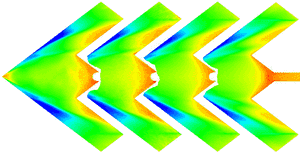 |
|
Purpose of the course
For investigations of pressure or temperature distributions on wind tunnel model surfaces with high spatial resolution, new experimental techniques such as Pressure-Sensitive Paint (PSP) or Temperature-Sensitive Paint (TSP) are required. Using these non-intrusive optical pressure measurement techniques, spatial structures and/or rapid temporal or spatial changes of aerodynamic phenomena (shocks on pitching airfoils in transonic flows, coherent structures, transition from laminar to turbulent flow etc.) can be investigated. Recently an increasing number of scientists and engineers has started to utilise the PSP technique to investigate pressure distributions in transonic, low speed, hypersonic and cryogenic wind tunnels, as well as in turbo machines. The PSP technique has also evolved from the measurement of steady state pressures to include both periodic and unsteady phenomena to study the instantaneous structure of pressure fields in various areas of fluid mechanics. This course, which is the 9th one on PSP organized by DLR Göttingen, Germany, will concentrate on both measurement techniques and aspects of the theory of PSP relevant to applications. In addition to lectures on the fundamental aspects of Pressure-Sensitive Paint Systems, emphasis is placed on the presentation of practical and reliable solutions for problems faced during the implementation of the technique in wind tunnels and other test facilities. During practical sessions in the course, the participants will have the opportunity of carrying out experiments in small groups on PSP/TSP characterisation, coating technique, and the recording and evaluation of PSP data. Recent developments of the PSP/TSP technique will be discussed and demonstrated. The participants are invited to prepare a poster to present their special interest in PSP or TSP which also can be helpful for discussions with experts about special technical aspects. |
|

